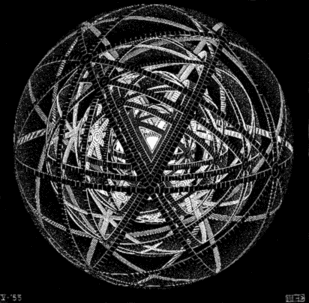In the past I have thought that a safer singularity would be brought about through the use of intelligence amplification, loosely defined as the merging of biological and machine/silicon intelligence, rather than artificial intelligence. The logic being that a human who has undergone IA and reached godlike powers will remember his humanity and remember it fondly.
Will there really be any difference between a human with extremely powerful IA and a straight up strong AI? Once either being reaches the level of intelligence and power where they hit the explosive curve of exponential growth I don't think that it will not make a difference. Their intelligence will have come so far that the origin of it may be insignificant.
However, I also tend to believe that a super intelligence will be inherently benevolent.
Showing posts with label AI. Show all posts
Showing posts with label AI. Show all posts
Sunday, December 10, 2006
Sunday, November 19, 2006
Marvin Minsky in Wired
Wired has been coming through with some pretty good articles lately. Articles that it takes some balls to print and happen to be things that hold a great amount of my interest. Rarely does one read about these topics elsewhere in the ink on dead tree world. Last months cover was devoted entirely to Atheism, with interviews with people like Daniel Dennett, Sam Harris, and Richard Dawkins. This month was a much smaller article in the Play Print section about Marvin Minsky's new book, "The Emotion Machine," his much anticipated follow up to The Society of Mind.
Wired writer David Pescovitz is interviewing Dennett and Minsky when he asks, "What would a machine that worked this way (like a human basically) look like?" Dennett answers by interpreting Minsky's initial response as, "It's too early to build the big model." Minsky replies, "Actually, I could quarrel with that. I think the architecture described in The Emotion Machine is programmable. If I could afford to get three or four first-rate systems programmers, we could do it"
He goes on to say that it's unfair something like the DARPA Grand Challenge gets millions to be worked on when something like this project receives, presumably, little to no money from outside sources. At the lest the Grand Challenge is related to AI. I would take that a step or two further and say that it makes you wonder why we pay actors millions of dollars to make 1.5 hour films about crap and pay sports stars million of dollars to run into each other 200 times in the course of an hour, but we can't muster up enough money to pay a couple programmers to code for, I don't know, a year or three. It's the difference between a few hours of entertainment versus reaching humankind's destiny within our lifetimes and very few people even know or care about it.
Wired writer David Pescovitz is interviewing Dennett and Minsky when he asks, "What would a machine that worked this way (like a human basically) look like?" Dennett answers by interpreting Minsky's initial response as, "It's too early to build the big model." Minsky replies, "Actually, I could quarrel with that. I think the architecture described in The Emotion Machine is programmable. If I could afford to get three or four first-rate systems programmers, we could do it"
He goes on to say that it's unfair something like the DARPA Grand Challenge gets millions to be worked on when something like this project receives, presumably, little to no money from outside sources. At the lest the Grand Challenge is related to AI. I would take that a step or two further and say that it makes you wonder why we pay actors millions of dollars to make 1.5 hour films about crap and pay sports stars million of dollars to run into each other 200 times in the course of an hour, but we can't muster up enough money to pay a couple programmers to code for, I don't know, a year or three. It's the difference between a few hours of entertainment versus reaching humankind's destiny within our lifetimes and very few people even know or care about it.
Labels:
AI,
artificial intelligence,
atheism,
Dennett,
minsky,
wired,
wired magazine
Subscribe to:
Posts (Atom)

